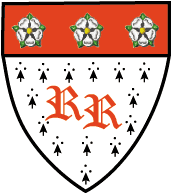


|
|
|
|
The ROEBUCK SURNAME by Dr. George Redmonds, "Origin of Surnames". ROEBUCK is one of those apparently straightforward surnames which presents problems only when its earliest history is investigated. It has been known in the north of England for nearly 800 years and for the last 400 of these, Yorkshire --- from Huddersfield to Sheffield --- has been its main home. The usual explanation of the surname's meaning is that it is a nickname from the male of the Roe Deer. In Old English this would have been "rabuc", a spelling which certainly fits in with some early examples such as Richard Rabuk who was taxed at Appleton Roebuck in 1379, and who doubtless belonged to the family which gave the village its distinguishing name. In the same Poll Tax of 1379, however, the surname was also spelled Raubot at Abmyn and Robut at Barnley, Silkstone and Sheffield. Nearly 100 years earlier Adam Roubuc living in Sheffield was well enough known to figure in a variety of documents and the different versions of his name, Roubuc, Roboc, and Rotel are evidence of the possible variations within one family. They also suggest that the families taxed in 1379 could quite easily have shared a common ancestor. If this use of a final "t" was an isolated case one might put it down to a clerk's error or a transcriber's error, but the fact is that wherever the surname occurred in the North in the Middle Ages "c" and "t" alternated. The earliest Yorkshire ROEBUCKS, for example, lived at Hovingham and in the period 1220 to 1320 all the following alternatives were used: RABOC, RABOT, RABOTH and RABOTT. Inevitably the persistent use of forms similar to Rabot makes one look for an alternative origin. Actually, Rabot survives as a French occupational surname for a "wood-worker" and it would not be impossible for this to have arrived here during the Norman occupation. Certainly Rabot was in use here during the Norman occupation only 100 years after the Conquest. Alternatively it may be that the true suffix is the diminutive "oc" or "ot" rather than "buc". In fact, much more detailed evidence covering the medieval period is necessary before categoric assertions can be made about the original meaning of ROEBUCK. What can be said is that even before the end of the Middle Ages the animal association was uppermost in people's minds for I find no Rabots after 1379. The family probably moved into the Huddersfield area from Barnsley or Silkstone around 1500 and there are ROEBUCKS in Kirkburton Parish Registers from the time of the first entries in 1540. Other branches lived at Flockton and Honley and only 100 years later the surname had become very common, particularly in Fulstone, Wooldale and Hepworth. Other branches were established in Kirkburton itself, Shelley and Kirkheaton. NAME VARIANTS: ROBUCKE, ROBUCK, ROBUK, ROBUC, ROBOKE, ROOBOOKE, RABUCK, ROEBUCKE, etc. |
|
|
Also included is a page giving an account of the Roebuck Surname from the results of the current ongoing research in England. |
|
|
The copyright of this website 2002 to 2008 belongs to the web owner. No part of this website may be sold, used for commercial
purposes or republished in any form, either in print, electronically
or otherwise, without the express permission of the web owner.
Any person, company or organisation found to be in breach of
the foregoing will be liable to prosecution. |
|